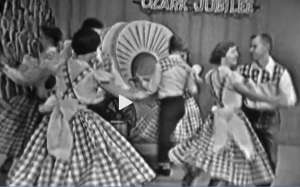Peters to Speak About Hillbilly Variety Shows
 In April and May, Tom Peters, Dean of Library Services at Missouri State University, will be giving two talks that explore and celebrate over one hundred years of “hillbilly variety shows” in the Ozarks and beyond.
In April and May, Tom Peters, Dean of Library Services at Missouri State University, will be giving two talks that explore and celebrate over one hundred years of “hillbilly variety shows” in the Ozarks and beyond.
The hillbilly variety show as a type of viable commercial entertainment is over one hundred years old now, and it’s still going strong. Every hillbilly variety show combines four basic elements: the playing of music on instruments such as the fiddle, banjo, guitar, bass, and mandolin; singing; dancing; and comedy.
Back in the second decade of the twentieth century, the Weaver Brothers and Elviry were very successful on the vaudeville circuit with their hillbilly variety show, which grew out of tent shows, medicine shows, toby shows, house parties, pie suppers, and other types of rural entertainment in the Upland South and elsewhere.
In the Twenties, Thirties, and Forties, numerous stage and radio hillbilly variety shows cropped up, including the National Barn Dance in Chicago, the Grand Ole Opry in Nashville, and Korn’s a Krackin’ in Springfield, Missouri, the Queen City of the Ozarks.
After World War II, television came to the forefront of popular entertainment, and hillbilly variety shows, notably the Ozark Jubilee, experienced substantial success as weekly live television programs, as well as innumerable local television shows in the ensuing decades, such as the Slim Wilson Show.
In the Sixties and Seventies location-based staged hillbilly variety shows at Lake of the Ozarks (Lee Mace’s Ozark Opry) and Branson (The Baldknobbers and Presley’s Country Jubilee) were successful, and they continue to be successful today. Even cave-based hillbilly variety shows, such as Farmarama, were successful. Tom Peters will discuss the formal and historic aspects and impact of hillbilly variety shows.
- On Tuesday, April 19th at 2:00 Peters will speak at the monthly meeting of the Institute of Mature Learners at Olin Library on the campus of Drury University.
- On Friday, May 27th he will speak on the same topic at the second annual meeting of the Ozarks Studies Association at the Shiloh Museum of Ozark History in Springdale, Arkansas.